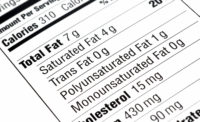NPD says consumers see gap between serving size on frozen food labels versus actual servings.
Nearly 2.5 million U.S. households had a frozen meal for dinner last night but it’s more than likely that the number of actual servings from the meal differed from the servings stated on the package label, according to food and beverage market research byThe NPD Group, Chicago.
A new NPD report, entitled "Frozen Meals Stay Hot! Where are Your Opportunities?," finds that one in three family/party-sized frozen meals that are labeled to have four plus servings are eaten by only one to two individuals. Over one-fourth of frozen meal users eating from a package that is labeled for two to three servings, consumes the frozen meal on their own, according to the report, which is based on a custom survey completed by a nationally representative sample of 2,500 adults, ages 18 and older.
“There is a disconnect between the stated serving size on a frozen meal package and what an individual is consuming,” says Darren Seifer, a food and beverage industry analyst at NPD. “As it is now, for one-quarter to one-third of frozen meal consumers, the labeled package serving size is more of a guideline to the frozen meal user than an actual serving size.”
Although many consumers disregard the servings size indicated on the frozen food package, they are concerned with portion sizes for a variety of reasons. NPD says its "Frozen Meals Stay Hot!" report finds that males, younger users, and even non-users are dissatisfied with the current portion sizes in frozen meals and want larger portions. Single-serve frozen meals, which account for two out of every three frozen meals eaten today, are popular as a carried lunch with young, working females and seniors who consume single-serve frozen meals in their homes.
“Consumers continue to seek out quick and convenient meal options and frequently frozen meals are the answer,” says Seifer. “It’s important for manufacturers and retailers to understand that various generational and demographic groups perceive frozen meals differently, and then respond to these variant needs with the right products, flavors, and marketing messages.”
Spotlight on frozen servings vs labeling
Looking for a reprint of this article?
From high-res PDFs to custom plaques, order your copy today!





